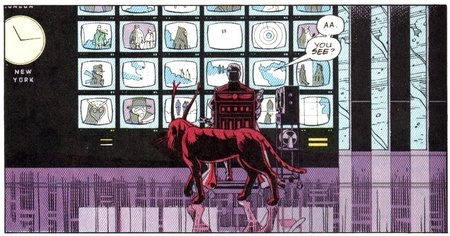We loooove Kevin Kelly around here at Snarkmarket. Robin tipped me off to his stuff and he's since joined Atul Gawande, Roger Ebert, Virginia Heffernan, Clay Shirky, Michael Pollan, Clive Thompson, Gina Trapani, Jason Kottke, Ben Vershbow, Hilzoy, Paul Krugman, Sy Hersh, and Scott Horton (among others) in the Gore-Gladwell Snarkfantastic Hall of Fame. Dude should have his own tag up in here.
But I think there's a rare misstep (or rather, misnaming) in his new Wired essay, "The New Socialism: Global Collectivist Society Is Coming Online." It's right there in the title. That S-word. Socialism.
Now, don't get me wrong. I like socialism where socialism makes sense. Almost everyone agrees that it makes sense to have a socialized police and military. I like socialized (or partially socialized) education, and I think it makes a lot of sense to have socialized health insurance, as part of a broad social safety net that helps keep people safe, capable, knowledgeable, working. Socialism gets no bad rap from me.
I know Kelly is using the word socialism as a provocation. And he takes pains to say that the new socialism, like the new snow, is neither cold nor wet:
We're not talking about your grandfather's socialism. In fact, there is a long list of past movements this new socialism is not. It is not class warfare. It is not anti-American; indeed, digital socialism may be the newest American innovation. While old-school socialism was an arm of the state, digital socialism is socialism without the state. This new brand of socialism currently operates in the realm of culture and economics, rather than government—for now...
Instead of gathering on collective farms, we gather in collective worlds. Instead of state factories, we have desktop factories connected to virtual co-ops. Instead of sharing drill bits, picks, and shovels, we share apps, scripts, and APIs. Instead of faceless politburos, we have faceless meritocracies, where the only thing that matters is getting things done. Instead of national production, we have peer production. Instead of government rations and subsidies, we have a bounty of free goods.
But I think of socialism as something very specific. It's something where a group of citizens pools their resources as part of a democratic (and at least partially technocratic) administering of benefits to everyone. This could be part of a nation-state or a co-op grocery store. And maybe this is too Hobbesian, but I think about it largely as motivated by a defense against something bad. Maybe there's some kind of general surplus-economy I'm missing where we can just socialize good things without risk. That'd be nice.
When masses of people who own the means of production work toward a common goal and share their products in common, when they contribute labor without wages and enjoy the fruits free of charge, it's not unreasonable to call that socialism.
But I'll put this out as an axiom: if there's no risk of something genuinely bad, no cost but opportunity cost, if all we're doing is passing good things around to each other, then that, my friend, is not socialism.
This is a weird paradox: what we're seeing emerge in the digital sphere is TOO altruistic to be socialism! There isn't enough material benefit back to the individual. It's not cynical enough! It solves no collective action problems! And again, it's totally individualistic (yet totally compatible with collectivities), voluntarist (yet totally compatible with owning one's own labor and being compensated for it), anti-statist (yet totally compatible with the state). It's too pure in its intentions and impure in its structure.
Kelly, though, says, we've got no choice. We've got to call this collectivism, even if it's collective individualism, socialism:
I recognize that the word socialism is bound to make many readers twitch. It carries tremendous cultural baggage, as do the related terms communal, communitarian, and collective. I use socialism because technically it is the best word to indicate a range of technologies that rely for their power on social interactions. Broadly, collective action is what Web sites and Net-connected apps generate when they harness input from the global audience. Of course, there's rhetorical danger in lumping so many types of organization under such an inflammatory heading. But there are no unsoiled terms available, so we might as well redeem this one.
In fact, we have a word, a very old word, that precisely describes this impulse to band together into small groups, set collective criteria for excellence, and try to collect and disseminate the best, most useful, most edifying, most relevant bodies of knowledge as widely and as cheaply as possible, for the greatest possible benefit to the individual's self-cultivation and to the preservation and enrichment of the culture as a whole.
And that word is
humanism.




